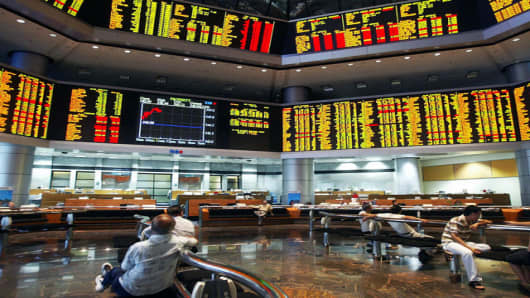
AP
Investors study shares prices during the morning trading at RHB private stock market gallery in Kuala Lumpur, Friday, Feb.3, 2006. Malaysia's key stock index rose Friday to a 15-week high as foreign funds plowed into key bluechips after a long holiday. The Composite Index of 100 blue chip stocks ended at 927.85 points, up 13.84 points or 1.5 percent from last Friday's close. (AP Photo) **MALAYSIA OUT**
But it wasn't enough to keep the Nikkei 225 Average in the black. After a see-saw session, the Nikkei closed down 0.3 percent, dragged lower by steel shares after JFE Holdings posted a 2.1 percent drop in annual profit and said it was not yet able to issue forecasts for the year to March 2009. Nippon Oil and other oil-related shares slid after oil slipped, though shipping firms powered higher after the Baltic Exchange's dry freight index, an indicator of seaborne trade for dry commodities, climbed 3.7 percent on Wednesday.
South Korea's KOSPI closed a touch lower with gains by technology shares undermined by automakers' losses, after Hyundai Motor's first-quarter earnings came way below market expectations.
Australian shares finished 1.2 percent weaker, as BHP Billiton led other resource firms lower on a fall in oil and metal prices, while worries about the health of the financial sector weighed on the banks.
Hong Kong stocks rose 1.6 percent, lifted by strong gains in the Shanghai market. Chinese power producers jumped as executives and investors expect the government to raise power tariffs as early as the third quarter of this year. Shares in China Resources Power rose as much as 19 percent while top electricity provider Huaneng Power International gained 9 percent although it posted an 80 percent fall in first-quarter earnings earlier in the week as its unit fuel cost rose 26 percent year-on-year.
Singapore's Straits Times Index was higher with shares of Singapore-listed Chinese firms or
S-shares climbing. Large cap firms such as rig-builders Cosco and Yangzijiang rose sharply. Yanlord Land rose as much as 9.1 percent on bargain hunting of stocks that are trading below net asset value.
The latest commodity to race to a record was rice, the world's second biggest food grain crop, which has hit successive new peaks due to worries about supply shortages that have led to political unrest and export restrictions.
Chicago Board of Trade July rough rice futures surged to a record high of $25.010 per hundredweight in early Asian trade. In the latest development, Brazil temporarily suspended rice exportson Wednesday to safeguard domestic supplies and keep prices of the basic foodstuff stable.


